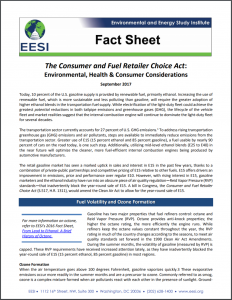Full Title: The Consumer and Fuel Retailer Choice Act: Environmental, Health & Consumer Considerations
Author(s):
Publisher(s): Environmental and Energy Study Institute
Publication Date: September 1, 2017
Full Text: Download Resource
Description (excerpt):
Today, 10 percent of the U.S. gasoline supply is provided by renewable fuel, primarily ethanol. Increasing the use of renewable fuel, which is more sustainable and less polluting than gasoline, will require the greater adoption of higher ethanol blends in the transportation fuel supply. While electrification of the light-duty fleet could achieve the greatest potential reductions in both tailpipe emissions and greenhouse gases (GHG), the lifecycle of the vehicle fleet and market realities suggest that the internal combustion engine will continue to dominate the light-duty fleet for several decades.
The transportation sector currently accounts for 27 percent of U.S. GHG emissions.1 To address rising transportation greenhouse gas (GHG) emissions and air pollutants, steps are available to immediately reduce emissions from the transportation sector. Greater use of E15 (15 percent ethanol and 85 percent gasoline), a fuel usable by nearly 90 percent of cars on the road today, is one such step. Additionally, utilizing mid-level ethanol blends (E25 to E40) in the near future will optimize the cleaner, more fuel-efficient internal combustion engines being produced by automotive manufacturers.
The retail gasoline market has seen a marked uptick in sales and interest in E15 in the past few years, thanks to a combination of private-public partnerships and competitive pricing of E15 relative to other fuels. E15 offers drivers an improvement in emissions, price and performance over regular E10. However, with rising interest in E15, gasoline marketers and the ethanol industry have run into an obscure piece of air quality regulation—Reid Vapor Pressure (RVP) standards—that inadvertently block the year-round sale of E15. A bill in Congress, the Consumer and Fuel Retailer Choice Act (S.517, H.R. 1311), would amend the Clean Air Act to allow for the year-round sale of E15.
